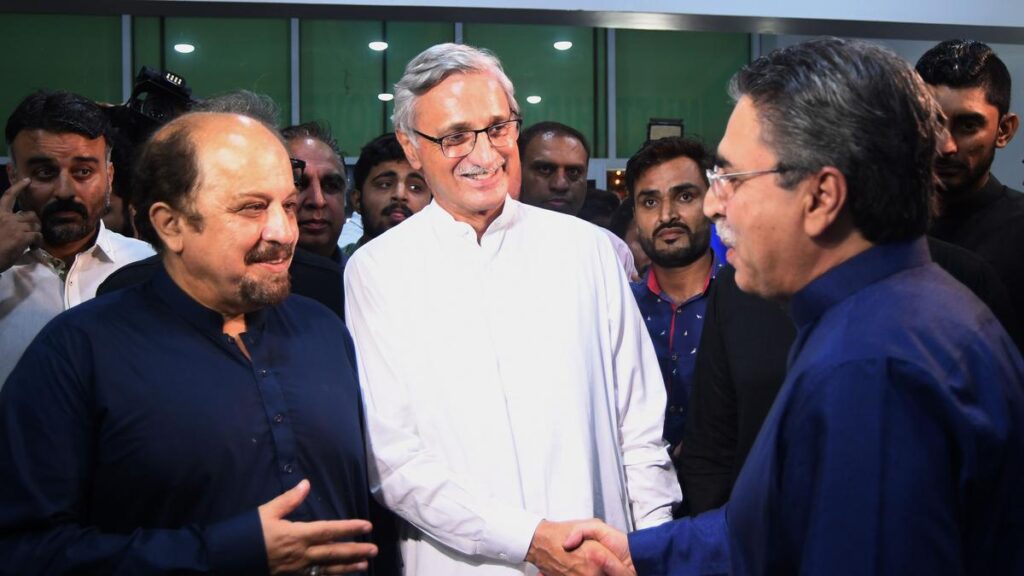Amir Khan (R), of the Pakistani Muttahida Qaumi Movement (MQM) party greets Jahangir Tareen (C), then-senior leader of Pakistan Tehreek-e-Insaf (Movement for Justice) party of Imran Khan, upon his arrival at the MQM headquarter in Karachi.
| Photo Credit: AFP
The Istihkam-e-Pakistan Party (IPP) was launched earlier this month by Jahangir Khan Tareen (JKT), a former key member of Imran Khan’s Pakistan Tehreek-e-Insaf (PTI), and Abdul Aleem Khan, another former close aide of Mr. Khan. “Dead on arrival” is how the PTI’s Shah Mehmood Qureshi dismissed the newly launched party.
Also Read | The political flux in Pakistan
Mr. Tareen was a kingmaker in 2018 when he delivered ‘independents’ for the PTI post-elections so that it could form government in Punjab. But after falling out with Mr. Khan around 2019-20, Mr. Tareen became politically isolated for a while until the vote of no-confidence of April 2022 when the JKT group helped Hamza Shehbaz, the son of Shehbaz Sharif, in his bid for the Chief Minister’s post in Punjab.
Last month, he was provided with another opportunity when the dismantling of the PTI began, after violent protests triggered by Imran Khan’s arrest.
Around a hundred PTI deserters, including some big names like former federal ministers Ali Zaidi, Fawad Chaudhry, Firdous Ashiq Awan, Aamer Kayani and former Sindh Governor Imran Ismail, left the PTI and were seen with the new party on the block.
Abdul Aleem Khan and Jahangir Khan Tareen were among the people who gave an identity to the PTI while it was still a struggling political outfit. They were part of the PTI’s crucial support system. But later on, Mr. Khan distanced himself from them after his government was formed in 2018. “It is not unusual for new political parties to emerge or for old parties to break before general elections. It is said that political parties are ideological but more or less, they have the same ideology. I wouldn’t call the IPP a new party as such because it has all those old stalwarts who were the faces of pre-May 9 PTI,” said Ayesha Bakhsh a senior anchorperson, referring to the day Mr. Khan was arrested.
‘Stability and prosperity’
The IPP, however, presents itself as a new beginning in Pakistan’s politics. Awn Chaudhry, additional secretary general and a spokesperson of the IPP, told The Hindu that the party is against “the politics of hate and divisions”. Its leadership seeks “political stability and prosperity” in Pakistan. But the party also seeks to maintain close ties with the Pakistan Muslim League-Nawaz (PML-N) of Prime Minister Shezbaz Sharif.
“I am a special assistant to Prime Minister Shehbaz and we have a very good working relationship with the PML-N. There will definitely be a seat adjustment or alliance with them,” said Mr. Awn Chaudhry when asked about the future electoral course of the IPP.
Were the PTI deserters ‘forced’ to join the IPP? Mr. Chaudhry dismisses such allegations. “Everyone who joined us has done so with their own choice. They left the PTI of their own accord. They know that the PTI’s future is not very bright and they have worked with Tareen before and are aware of his competence and capability.”
However, a former PTI member who joined the IPP told The Hindu on the condition of anonymity: “The hundred people who joined the IPP have been forced to join this party; not a single PTI member joined on their own.”
Over the weekend, reports emerged that some leaders associated with the newly launched party, including Fawad Chaudhry, Ali Zaidi and Imran Ismail, have not officially joined the IPP.
On the face of it, the IPP has been designed to undercut the PTI’s popularity, especially in south Punjab and other rural areas of the province. “But its chances of securing election victories are low. It might help the PML-N in some constituencies but I don’t see any major adjustments taking place,” said political analyst Umair Javed.
King’s party
The PTI dismissed the relevance of the IPP’s formation. Senior party leader and former federal minister Hammad Azhar said every now and then Pakistan had seen the creation of ‘a King’s Party’. “Its purpose is usually to grab space from genuine political parties and then lend legitimacy to anti-democratic regimes. The IPP is no different. However, this time, this model seems to be failing. The imagination of the voters in Pakistan is completely captured by Imran Khan. His popularity is unmatched and voters are connecting with him directly.”
As elections are expected to be held in a few months, political deliberations are pickling up pace in Pakistan. The Pakistan People’s Party (PPP) of Bilawal Bhutto Zardari, who is now the Foreign Minister of the Shezbaz Sharif government, had also tried to recruit PTI deserters after the May 9 protests. There were reports that the PPP was unhappy about the emergence of the IPP because otherwise both the PPP and the PML-N would have taken the PTI defectors. “Now this new party will eat into their votebank, said Ms. Bakhsh, the anchorperson.
“At the moment we can say that people are joining the IPP as they want to participate in politics; they are being cautious about the possibility of the PTI not being allowed space in the coming elections. The IPP will either contest elections on its own or will go for a seat adjustment [with the PML-N].”
However, a deciding factor of the coming elections would be whether the PTI would contest elections or not, or whether they would be allowed to contest on their election symbol (bat), say analysts. “PTI voters are confused at the moment as they feel betrayed by what’s happening now,” added Ms. Bakhsh.
[ad_2]
Source link

